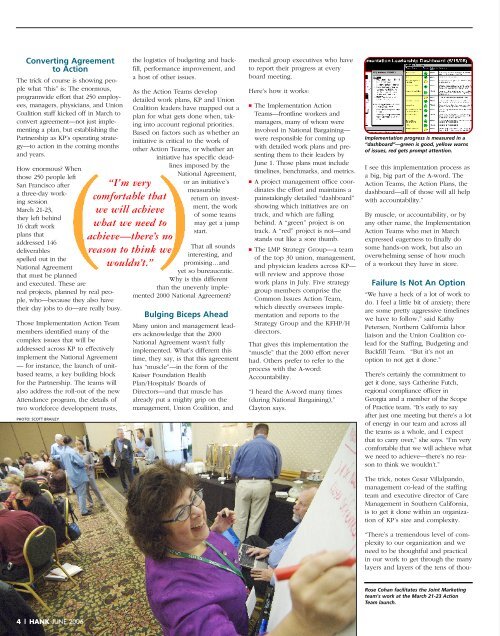Download PDF - Labor Management Partnership
Download PDF - Labor Management Partnership
Download PDF - Labor Management Partnership
Create successful ePaper yourself
Turn your PDF publications into a flip-book with our unique Google optimized e-Paper software.
Converting Agreement<br />
to Action<br />
The trick of course is showing people<br />
what “this” is: The enormous,<br />
programwide effort that 250 employees,<br />
managers, physicians, and Union<br />
Coalition staff kicked off in March to<br />
convert agreement—not just implementing<br />
a plan, but establishing the<br />
<strong>Partnership</strong> as KP’s operating strategy—to<br />
action in the coming months<br />
and years.<br />
How enormous? When<br />
those 250 people left<br />
San Francisco after<br />
a three-day working<br />
session<br />
March 21-23,<br />
they left behind<br />
16 draft work<br />
plans that<br />
addressed 146<br />
deliverables<br />
spelled out in the<br />
National Agreement<br />
that must be planned<br />
and executed. These are<br />
real projects, planned by real people,<br />
who—because they also have<br />
their day jobs to do—are really busy.<br />
Those Implementation Action Team<br />
members identified many of the<br />
complex issues that will be<br />
addressed across KP to effectively<br />
implement the National Agreement<br />
— for instance, the launch of unitbased<br />
teams, a key building block<br />
for the <strong>Partnership</strong>. The teams will<br />
also address the roll-out of the new<br />
Attendance program, the details of<br />
two workforce development trusts,<br />
PHOTO: SCOTT BRAILEY<br />
“I’m very<br />
comfortable that<br />
we will achieve<br />
what we need to<br />
achieve—there’s no<br />
reason to think we<br />
wouldn’t.”<br />
the logistics of budgeting and backfill,<br />
performance improvement, and<br />
a host of other issues.<br />
As the Action Teams develop<br />
detailed work plans, KP and Union<br />
Coalition leaders have mapped out a<br />
plan for what gets done when, taking<br />
into account regional priorities.<br />
Based on factors such as whether an<br />
initiative is critical to the work of<br />
other Action Teams, or whether an<br />
initiative has specific deadlines<br />
imposed by the<br />
National Agreement,<br />
or an initiative’s<br />
measurable<br />
return on investment,<br />
the work<br />
of some teams<br />
may get a jump<br />
start.<br />
That all sounds<br />
interesting, and<br />
promising…and<br />
yet so bureaucratic.<br />
Why is this different<br />
than the unevenly implemented<br />
2000 National Agreement?<br />
Bulging Biceps Ahead<br />
Many union and management leaders<br />
acknowledge that the 2000<br />
National Agreement wasn’t fully<br />
implemented. What’s different this<br />
time, they say, is that this agreement<br />
has “muscle”—in the form of the<br />
Kaiser Foundation Health<br />
Plan/Hospitals’ Boards of<br />
Directors—and that muscle has<br />
already put a mighty grip on the<br />
management, Union Coalition, and<br />
medical group executives who have<br />
to report their progress at every<br />
board meeting.<br />
Here’s how it works:<br />
■ The Implementation Action<br />
Teams—frontline workers and<br />
managers, many of whom were<br />
involved in National Bargaining—<br />
were responsible for coming up<br />
with detailed work plans and presenting<br />
them to their leaders by<br />
June 1. Those plans must include<br />
timelines, benchmarks, and metrics.<br />
■ A project management office coordinates<br />
the effort and maintains a<br />
painstakingly detailed “dashboard”<br />
showing which initiatives are on<br />
track, and which are falling<br />
behind. A “green” project is on<br />
track. A “red” project is not—and<br />
stands out like a sore thumb.<br />
■ The LMP Strategy Group—a team<br />
of the top 30 union, management,<br />
and physician leaders across KP—<br />
will review and approve those<br />
work plans in July. Five strategy<br />
group members comprise the<br />
Common Issues Action Team,<br />
which directly oversees implementation<br />
and reports to the<br />
Strategy Group and the KFHP/H<br />
directors.<br />
That gives this implementation the<br />
“muscle” that the 2000 effort never<br />
had. Others prefer to refer to the<br />
process with the A-word:<br />
Accountability.<br />
“I heard the A-word many times<br />
(during National Bargaining),”<br />
Clayton says.<br />
Implementation progress is measured in a<br />
“dashboard”—green is good, yellow warns<br />
of issues, red gets prompt attention.<br />
I see this implementation process as<br />
a big, big part of the A-word. The<br />
Action Teams, the Action Plans, the<br />
dashboard—all of those will all help<br />
with accountability.”<br />
By muscle, or accountability, or by<br />
any other name, the Implementation<br />
Action Teams who met in March<br />
expressed eagerness to finally do<br />
some hands-on work, but also an<br />
overwhelming sense of how much<br />
of a workout they have in store.<br />
Failure Is Not An Option<br />
“We have a heck of a lot of work to<br />
do. I feel a little bit of anxiety; there<br />
are some pretty aggressive timelines<br />
we have to follow,” said Kathy<br />
Petersen, Northern California labor<br />
liaison and the Union Coalition colead<br />
for the Staffing, Budgeting and<br />
Backfill Team. “But it’s not an<br />
option to not get it done.”<br />
There’s certainly the commitment to<br />
get it done, says Catherine Futch,<br />
regional compliance officer in<br />
Georgia and a member of the Scope<br />
of Practice team. “It’s early to say<br />
after just one meeting but there’s a lot<br />
of energy in our team and across all<br />
the teams as a whole, and I expect<br />
that to carry over,” she says. “I’m very<br />
comfortable that we will achieve what<br />
we need to achieve—there’s no reason<br />
to think we wouldn’t.”<br />
The trick, notes Cesar Villalpando,<br />
management co-lead of the staffing<br />
team and executive director of Care<br />
<strong>Management</strong> in Southern California,<br />
is to get it done within an organization<br />
of KP’s size and complexity.<br />
“There’s a tremendous level of complexity<br />
to our organization and we<br />
need to be thoughtful and practical<br />
in our work to get through the many<br />
layers and layers of the tens of thou-<br />
Rose Cohan facilitates the Joint Marketing<br />
team's work at the March 21-23 Action<br />
Team launch.<br />
4 | HANK JUNE 2006









![Value Compass: Team Planning Worksheet [Open PDF]](https://img.yumpu.com/28700058/1/190x245/value-compass-team-planning-worksheet-open-pdf.jpg?quality=85)


![2010 National Agreement [PDF] - Labor Management Partnership](https://img.yumpu.com/27738003/1/107x260/2010-national-agreement-pdf-labor-management-partnership.jpg?quality=85)
